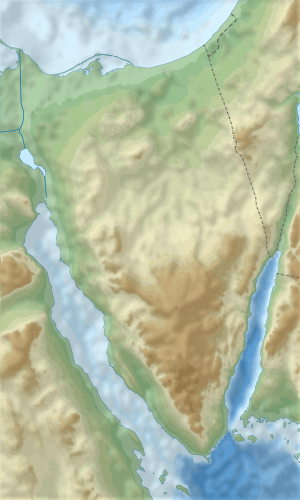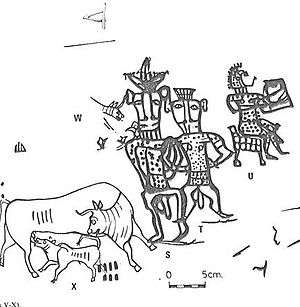Kuntillet Ajrud
Kuntillet Ajrud (Arabic: كونتيلة عجرود) is a late 9th/early 8th centuries BCE site in the northeast part of the Sinai Peninsula.[1] It is frequently described as a shrine, though this is not certain.[2]
كونتيلة عجرود | |
 Shown within Sinai | |
| Region | Sinai |
|---|---|
| Coordinates | 30°11′35″N 34°25′16″E |
| History | |
| Material | Stone |
| Periods | Iron Age |
| Cultures | Israelite |
| Site notes | |
| Excavation dates | 1975–76 |
| Archaeologists | Ze’ev Meshel |
Excavations
Kuntillet Ajrud (Arabic كونتيلة عجرود) is in north Sinai; carbon-14 dating indicates occupation in the period 801-770 BCE, and the texts may have been written c.800 BCE.[3] As a perennial water source in this arid region it constituted an important station on an ancient trade route connecting the Gulf of Aqaba (an inlet of the Red Sea) and the Mediterranean, and was in addition located only 50 kilometers from the major oasis of Kadesh Barnea.[4]
The site was excavated in 1975/76 by Tel Aviv University archaeologist Ze’ev Meshel, and the excavation report was published in 2012. The fortress-like main building is divided into two rooms, one large and the other small, both with low benches. Both rooms contained various paintings and inscriptions on the walls and on two large water-jars (pithoi), one found in each room. The paintings on the pithoi show various animals, stylised trees, and human figures, some of which may represent gods. They appear to have been done over a fairly considerable period and by several different artists, and do not form coherent scenes. The iconography is entirely Syrian/Phoenician and lacks any connection to the Egyptian models commonly found in Iron Age IIB Israel art.[5]

The inscriptions are mostly in early Hebrew with some in Phoenician script.[6] Many are religious in nature, invoking Yahweh, El and Baal, and two include the phrases "Yahweh of Samaria and his Asherah" and "Yahweh of Teman and his Asherah."[7] There is general agreement that Yahweh is being invoked in connection with Samaria (capital of the kingdom of Israel) and Teman (in Edom); this suggests that Yahweh had a temple in Samaria, and raises a question over the relationship between Yahweh and Kaus, the national god of Edom.[8] "Asherah" was originally a goddess, her name eventually evolving in the biblical period into the designation of her cultic pole.[9]
See also
References
Citations
- Gnuse 1997, p. 69-70.
- Hadley 2000, p. 108.
- Mastin 2005, p. 326.
- Schniedewind 2017, p. 135.
- Keel & Uehlinger 1998, p. 210ff.
- Bonanno, Anthony, "Archaeology and fertility cult in the ancient Mediterranean", (University of Malta, 1986) pp.238ff.
- Bonanno, Anthony, "Archaeology and fertility cult in the ancient Mediterranean", (University of Malta, 1986) pp.238ff.
- Keel & Uehlinger 1998, p. 228.
- Hadley 2000, p. 209.
Bibliography
- Gnuse, Robert Karl (1997). No other gods: emergent monotheism in Israel. Sheffield Academic Press.CS1 maint: ref=harv (link)
- Hadley, Judith M. (2000). The Cult of Asherah in Ancient Israel and Judah: Evidence for a Hebrew Goddess. Cambridge University Press. ISBN 9780521662352.CS1 maint: ref=harv (link)
- Keel, Othmar; Uehlinger, Christoph (1998). Gods, goddesses, and images of God in ancient Israel. Fortress Press.CS1 maint: ref=harv (link)
- Mastin, B.A. (2005). "Yahweh's Asherah, Inclusive Monotheism and Dating". In Day, John (ed.). In Search of Pre-Exilic Israel. Bloomsbury.CS1 maint: ref=harv (link)
- Rendsburg, Gary S. (2008). "Israel Without the Bible". In Greenspahn, Frederick E. (ed.). The Hebrew Bible: New Insights and Scholarship. NYU Press.CS1 maint: ref=harv (link)
- Schniedewind, Willliam M. (2017). "An Early Iron Age Phase to Kuntillet 'Ajrud?". In Greenspahn, Frederick E.; Rendsburg, Gary A. (eds.). Le-maʿan Ziony: Essays in Honor of Ziony Zevit. Wipf and Stock.CS1 maint: ref=harv (link)
- Vriezen, T. C.; van der Woude, Simon Adam (2005). Ancient Israelite And Early Jewish Literature. Brill. ISBN 978-90-04-12427-1.